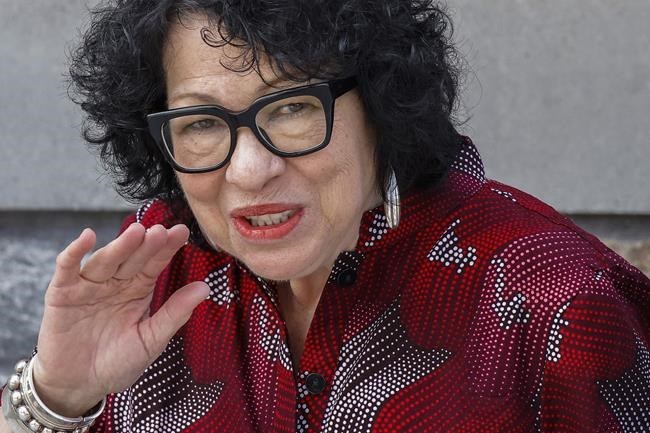
FILE - U.S. Supreme Court Justice Sonia Sotomayor greets people as she attends a ceremony during the opening of the Yonkers Public School District's new Justice Sonia Sotomayor Community School on Monday, Sept 16, 2024, in New York. (AP Photo/Eduardo Munoz Alvarez, File)
February 06, 2025 - 10:15 AM
LOUISVILLE, Ky. (AP) — U.S. Supreme Court Justice Sonia Sotomayor said her conservative colleagues are risking the court's legitmacy with decisions affording President Donald Trump broad immunity and overturning longstanding precedents on other issues.
In her first public comments since Trump began his second term in the White House, Sotomayor told a Kentucky audience that the court has gone too far, too fast on a range of issues. She cited the Trump case during a lengthy response to a question about sagging public confidence in the court.
Sotomayor issued a stinging dissent in that case, and she didn't hold back Wednesday night in discussing public perceptions of the court following its historic 6-3 decision on the immunity question. The court’s conservative majority, with three justices appointed by Trump in his first term, ruled for the first time that former presidents have broad immunity from prosecution.
“If we as a court go so much further ahead of people, our legitimacy is going to be questioned," Sotomayor said during the event in Louisville. “I think the immunity case is one of those situations. I don’t think that Americans have accepted that anyone should be above the law in America. Our equality as people was the foundation of our society and of our constitution.”
In her dissent last year, which she read aloud in the courtroom, Sotomayor said the court's majority allowed a president to become a “king above the law” in its ruling that limited the scope of criminal charges against Trump for his role in the Jan. 6, 2021, riot at the U.S. Capitol and efforts to overturn the election.
She renewed her objections while discussing the case to the Louisville audience.
“Our constitution itself has provisions not exempting the president from criminal activity after an impeachment,” she said. "So I had a hard time with the immunity case. And if we continue going in directions that the public is going to find hard to understand, we’re placing the court at risk.”
Earlier in her answer to the question about lagging public confidence in the court, Sotomayor pointed to her conservative colleagues' willingness to upend decades-old precedents.
“I think my court would probably gather more public support if it went a little more slowly in undoing precedent,” Sotomayor said.
Other seismic shifts made by the high court in recent years have included overturning Roe v. Wade to end nationwide protections for abortion rights, and striking down affirmative action in college admissions.
Sotomayor said precedent-busting rulings have become more frequent, and she focused on the public fallout from courts going too far too fast.
“I think that creates instability in the society, in people’s perception of law and people’s perception of whether we’re doing things because of legal analysis or because of partisan views," she said. “Whether those views are accurate or not, I don’t accuse my colleagues of being partisan.”
She said they “genuinely have a belief in a certain way of looking at the Constitution.”
“And I understand, in good faith, that they think that that belief better promotes our democracy,” she said. "But whether that’s true or not is irrelevant if people are feeling insecure in the changes that they’re instituting at a pace that they can’t absorb.”
Sotomayor spent more than an hour answering questions from the the dean of the University of Louisville law school. The justice received the law school’s Brandeis Medal, presented to people in the legal profession for their work advancing public service and their devotion to economic, social or political justice. UofL’s law school is named for Louis D. Brandeis, a former Supreme Court justice from Louisville.
Sotomayor was nominated to the Supreme Court by President Barack Obama in 2009.
News from © The Associated Press, 2025